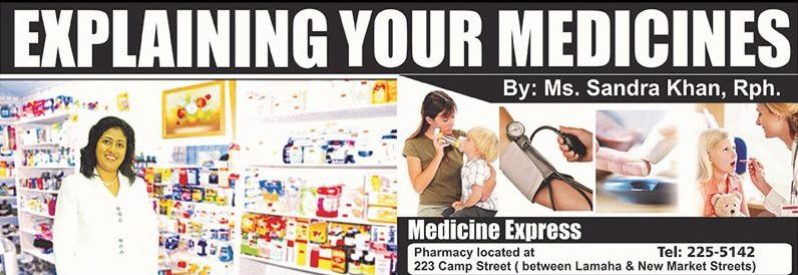MEDICATIONS are chemical substances which alter your body’s functional systems. Concomitant use with certain foods and drugs can result in drug-food and drug-drug interactions, which can negatively impact on their performance and yield undesirable effects on the body. The reason for which medication blood concentrations are affected is because of the alteration of the pharmacokinetic processes of drug absorption and first pass metabolism. Some foods deactivate the proteins that transport these chemicals into the body, either reducing or increasing the amount of drug absorbed into the blood. First pass metabolism is the other process where the drug is broken down into an active form by certain enzymes produced by the liver and rarely by the small intestines. Some drugs and foods can affect the production of these enzymes, CYP450 and CYP3A4. So timely advisories to consumers on medication use, whether OTC (over the counter) or POM (prescription only medicines), is a priceless asset.
Grapefruit
This fruit is highlighted in pharmaceutical references, to be avoided with many drugs like statins (cholesterol lowering e.g. simvastatin and atorvastatin), some antihypertensive (e.g. nifedipine), some antihistamines (allergy meds e.g. Allegra) and others. Like with other fruit juices, grapefruit juice interferes with the drug absorption process resulting in lowered effects of some antihistamines. However, it raises the effects of statins since this enzymatic breakdown or metabolism is affected in both the liver and small intestines. Thus, a higher than required amount of drug can be found in the blood. Excessive consumption of grapefruit with statins may lead to liver and muscle damage and over time kidney failure.
Milk
Milk and milk products such as cheese, yogurt and ice cream contain calcium, magnesium and casein which can interact with various antibiotics. This is one of the reasons why antibiotics like tetracycline is chelated (rendered inactive by combination with metallic ions), thus not allowing adequate blood concentration for its bactericidal or bacteriostatic effects. It must be noted that not all antibiotics are chelated and so ensure that you are informed appropriately when antibiotics are dispensed.
Chocolate
Sedatives or anti-anxiety medications (like zolpiderm) may not work as effectively if you consume with especially dark chocolate, which has a higher percentage of cocoa. Whilst some stimulants (like Ritalin) can be boosted and for some antidepressants like MAOI (monoamine oxidase inhibitors) there can be a spike in blood pressure.
Iron formulations
It is advisable not to take iron supplements whether in tablets or liquid formulations concomitantly with thyroid enhancing medications like levothyroxine. It must be noted that some multivitamins, cereals and certain foods also contain iron.
Tea/ coffee
Persons with a low blood count who use vitamins and iron supplements to boost their hemoglobin levels, should not take medication with tea or coffee since the tannins contained bind to the iron by chelation and render it inactive. So money is loss when the product is consumed in this manner, it becomes null and void. However, if vitamins and iron supplements are taken with a glass of orange, cherry juice or lime beverages which has lots of vitamin C, then the iron is fully absorbed and maximises its benefits for the anemic patient.
Also antipsychotic drugs (like lithium and clozapine) levels are reduced with coffee but other meds (like aspirin, epinephrine and albuterol) are boosted along with their side effects.
Alcohol
Antihypertensive and heart medications are made less effective when alcohol is used with them. However for other meds like sedatives (like Zyqil, valium) and antihistamines (like piriton) their drowsy effects can be potentiated.
Antihistamines
These are drugs for allergic symptoms and are commonly found in flu preparations for sneezing, itches or running nose. However, they may cause an increase in the heart rate and reduce the effect of hypertensive medications. This effect is more pronounced with short acting antihistamines hence you should consult your doctor or pharmacist for advice when required to make a choice.
Anti-epileptic drugs
Epileptic females who are not desirous of getting pregnant could experience some problems with the contraceptive pills since the epileptic meds may interact reducing their pregnancy prevention effect.
Vitamin K
Apart from supplements, this vitamin can be found in naturally occurring foods such as broccoli, kale and spinach and its deficiency may increase bleeding disorders. So persons on anticoagulants (like warfarin and Xarelto) need to be cautious with vitamin K consumption.
Ginseng
Like the vitamin K, ginseng is also associated with bleeding especially with concomitant use of aspirin, ibuprofen, Aleve and also blood thinners like warfarin and Xarelto. Headaches, sleeping problems and nervousness are experienced when using ginseng with some antidepressants like MAOI.
For further pharmacological guidance and physician referral, contact the pharmacist of Medicine Express PHARMACY located at 223 Camp Street, between Lamaha and New Market Streets. If you have any queries, comments or further information on the above topic kindly forward them to medicine.express@gmail.com or send them to 223 Camp Street, N/burg. Tel #225-5142.



.jpg)










